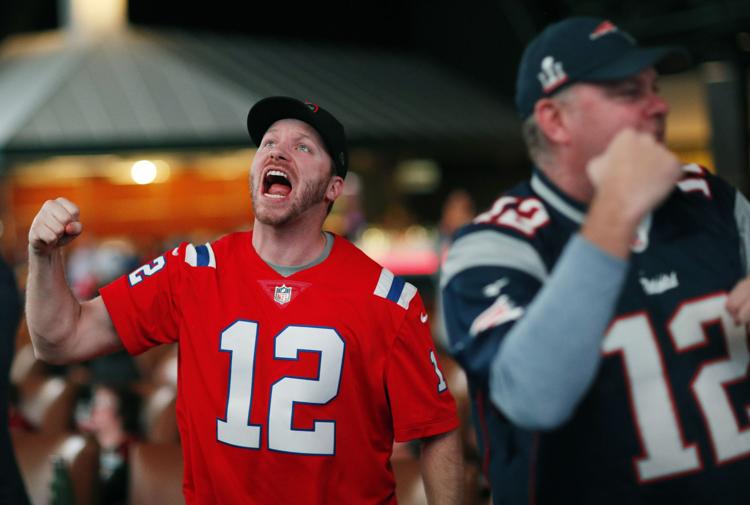
Darin Smith, right, and Derrick Chapman celebrate while watching Super Bowl 53 between the New England Patriots and the Los Angeles Rams at the Westgate Superbook sports book, Sunday, Feb. 3, 2019, in Las Vegas.
John Locher / AP
(Johnny Kampis) – On a recent afternoon in downtown Las Vegas along famed Fremont Street, there is a flurry of activity in the William Hill Sportsbook inside Binion’s casino. Bettors holding their tickets glance up hopefully at screens broadcasting horse races while screens post various odds, including – surprise – the New England Patriots among the favorites to win the next Super Bowl at 7-2.
Despite the plethora of sports betting that is being legalized in states across the country after the Supreme Court overturned the Professional and Amateur Sports Protection Act (PASPA) last May, the wagering in Nevada remains brisk. It helps that Vegas is, and will always be, a popular tourist destination, so many of those bets will continue to be placed by out-of-town visitors.
Some in Las Vegas were concerned that a decentralization of sports betting would be financially destabilizing for Nevada. But casino companies like Caesars Entertainment, MGM Resorts International and Boyd Gaming are diversified with holdings around the country so they are benefiting from the nationwide expansion.
Another factor may be responsible for the continued attraction of sports betting in Las Vegas; the tax code. Nevada continues to offer the lowest tax rate on sports bets at 6.75 percent.
Dan Michalski, a Las Vegas-based gaming industry analyst and editor of OnlineGambling.com, told the Taxpayers Protection Alliance Foundation (TPAF) there has not been a significant change in the wagering numbers in the Silver State. Indeed, even as some states were beginning to offer their own sports betting in 2018, the total amount wagered in Nevada eclipsed $500 million during each month of last year’s NFL season.
“Right now the country is going sports-betting crazy and Las Vegas is happy to be the leader,” Michalski said. “The low tax is definitely part of the advantage.”
Higher taxes can be passed on to the consumer in the form of worse odds or increased vigorish. Critics of higher tax rates warn these tactics could keep many bettors going to the black market of offshore operators, the only way for most non-Nevadans to bet on sports before PASPA was overturned.
“The product has to be good enough to lure people over,” Michalski said. “If the offshore site is better, especially for the professional gambler, they won’t be easily pulled over.”
Sara Slane, senior vice president of public affairs for the American Gaming Association, said states should focus on consumers and empower operators to offer a competitive product that fosters a safe betting environment.
“High tax rates hinder the legal market’s ability to compete with shady, illegal operators that don’t pay taxes back to the state,” she said.
While some states such as New Jersey (9.75 percent for land-based sports betting) and Mississippi (10 percent) have kept their rates relatively low, others such as Pennsylvania (36 percent, plus a $10 million operator licensing fee) and Rhode Island (51 percent of revenue) have opted for sky-high tax rates.
Kevin O’Toole, executive director of the Pennsylvania Gaming Control Board, told Penn Bets he doesn’t think the higher tax rates will hurt the betting volume.
“The player, regardless of what type of gambling they like to play, has no concern about the tax rate,” he said. “The tax rate affects other things, but it doesn’t affect a patron’s decision on where to gamble, or what type of activity they want to gamble on.”
But Marc Dunbar, a Florida-based attorney in the gaming industry, said at a gaming conference in New Orleans earlier this year that high tax rates hurt operators, and therefore consumers. He pointed out that sophisticated computer technology allows those operators to detect trends and balance risk – as well as protect consumers.
“They’re not in the game to lose money, obviously,” he said. “But what you need to do as policymakers is to make sure to create an environment to allow these technology businesses to thrive and to reinvest in more technology. That’s the best line of defense against fraud.”
Dunbar said “regulatory or tax handcuffs” will aid exploitation.
“You need only look around the world to see ways that it can happen – if not sports betting, then lottery or horse racing,” he said. “If you don’t allow tech companies to invest in more product, they will not be able to be as sophisticated as the people who want to cheat the game.”
Nearly a dozen states now have legalized sports betting, and Michalski points out there are about 20 more that are considering legislation to allow betting. In a sense, this rising tide will lift all boats. He notes the expansion of the industry will bring more jobs and economic partnerships to help the bottom line of Las Vegas-based gaming industry companies.
“Nevada supports this,” he told TPAF. “The casino industry is championing this. It’s definitely seen as an economic boon.”
By Johnny Kampis | The Center Square
Johnny Kampis is an investigative reporter for the Taxpayers Protection Alliance Foundation, and has been published in The New York Times, Time.com, FoxNews.com and the Atlanta Journal-Constitution.


Facebook
Twitter
Pinterest
RSS